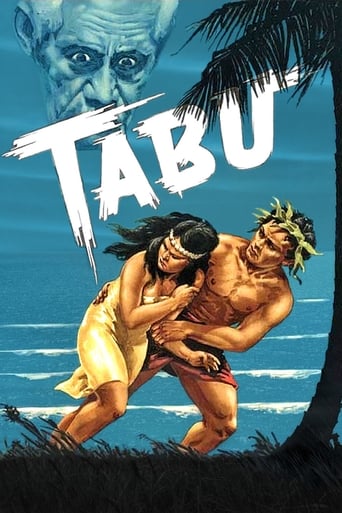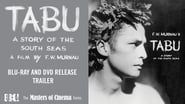st-shot
This beautiful and simple story of a South Seas love and loss romance might be the last great silent from the era. Along with City Lights (made the same year) it may well be credited as the apogee of the silent period even with the writing on the wall ( microphones in the plants) since 1927.On the island of Bora Bora experiencing the full bloom of youth and beauty a girl and boy find love. Her radiance however is coveted by the Old Warrior who holds huge sway over his people as he demands she be his next wife. The lovers run off, find safe haven and employment on a more "civilized island" where the locals and Asian merchants exploit their innocence. Bribing a local cop, he's allowed to stay on but the threat of the Old Warrior causes vacillation on the girl's part who struggles with the fact that the only way to save her lover is to leave him. FW Murnau's last film was fraught with budget and personality difficulties as he and his co-director Robert Flaherty did not see eye to eye. Distilling to a native crew and relying on Floyd Crosby's outstanding capture of the island paradise, it's people and the unabashed joie de vivre of a life in the sun Murnau movingly follows his doomed duo stranded in Eden, hunted by a stoic resolve that builds to a dire crescendo. Trapped by tradition, exploited by modern society Murnau paints his pair of protagonists into a corner and in the process paints a masterpiece of simple storytelling of his own.
bragant
A tale of forbidden love, TABU is best-remembered today as legendary German director FW Murnau's last film - he was killed in a car accident only one week before its New York premiere. Murnau had been working in Hollywood since the mid-1920s, and had already directed several films in the United States, but of these, only the famous SUNRISE (1927) was a success. By 1930, Murnau had become tired of the Hollywood system and was thinking about returning to Germany, but a timely introduction to Robert F. Flaherty - at that time famous as the director of the classic documentary NANOOK OF THE NORTH - sparked an ill-fated collaboration that resulted in this gorgeous, hypnotic and unforgettable film.At first, Murnau and Flaherty intended to produce a "Nanook-style" documentary of Tahiti and its people, but several problems intervened: Flaherty and Murnau turned out to have radically different ideas about film-making in general and this project in particular; Flaherty's skills as a cinematographer were not up to the task and another DP had to be called in; and Flaherty's working relationship with the domineering Murnau fell apart when - instead of being co-director as the two had agreed - Flaherty found himself spending most of his time in the lab developing Muranu's film. Only one scene directed by Flaherty remains in TABU - the opening spearfishing sequence - and sad to say, the quality of this scene is no match for Murnau's exquisite footage. In addition, Flaherty decided that he hated the story - he found it too Westernized and fairy-tale-like. After a period of mutual discontent, Murnau bought out Flaherty, sent the entire Hollywood crew back to California, and took over the project completely - even training Tahitian natives in film-making techniques so he could employ the locals as his crew. With the exception of Anne Chevalier - a local French/Tahitian woman whom Murnau discovered performing in a bar in Bora Bora - the entire cast and crew save Murnau and his cinematographer was made up of nonprofessionals.The film which resulted from this choice is a unique hybrid of documentary and fiction, with a mythic, fantasmatic air about it that is very hard to define - there is no other movie like TABU. Certainly, the fact that we are watching actual Tahitian natives going about their daily business rather than professional actors lends the film a patina of authenticity and realism which makes it impossible to categorize TABU as some sort of Western-colonial-white people's fantasy of the South Seas - in fact, the film's depiction of tribal culture is quite complex and thought-provoking, as we will see...The plot of TABU is diagramatically simple - the idyllic lives of a Bora Bora fisherman (called Matahi) and his beloved, Reri (Anne Chevalier) are destroyed when tribal elders decree that Reri is so perfect a specimen of local womanhood that the gods have selected her for the honor of becoming their sacrificial victim. Reri immediately becomes TABU - forbidden - to Matahi as she must come before the gods untouched by man. Not surprisingly, Matahi disagrees with the gods' choice. He kidnaps Reri and the two flee to a neighboring island where they believe they will be safe. Unfortunately, this particular island has been taken over by Western civilization and thus the innocent Matahi and Reri have to navigate some very unfamiliar and peculiar customs - like debt and credit. Matahi begins working as a pearl diver, but he is unable to understand money (or handle liquor) and is threatened with violence when he cannot repay a debt. The couple flee once more, desperate for a safe haven, but they do not find one. Matahi and Reri's lives become more and more insecure and in due course of time, the tribal elders track them down anyway. Realizing that the only choice they have is to return to the world they know, Reri resigns herself to her fate, but will Matahi accept the inevitable? A mere plot-summary cannot fully express what TABU is like as a visual and intellectual experience. The film's treatment of native culture is extremely complex - unlike the "noble savage" cliché so popular among Western audiences and seen most recently in AVATAR, Murnau's Bora Bora seems like Eden on the surface, but is governed by a rigid code of conduct which squashes individuality and personality. Matahi and Reri's innocent love is doomed from the beginning, as they are caught between two worlds and unable to find a place in either. Ultimately, the beauty and simplicity of tribal life in Bora Bora - so seductive to the eye and ear in the first part of the film - is shown to be a soul-destroying deathtrap governed by superstition and groupthink. Of course, Murnau depicts the Western system as being no better - European civilization is shown as not much more than drunken, greedy, exploitative artifice out to rape the entire world for a fast buck. TABU is in many ways a terrifying film, where pure love is doomed in the face of money and authority, and even the gorgeous purity of the Tahitian Islands seems tainted by human greed and foolishness. This masterpiece will haunt you for a long time after you have seen it, partly because of the riveting story, and partly because of the exquisite cinematography by Floyd Crosby, who deservedly won an Academy Award for his efforts. Do not miss this legendary masterwork of cinema!
Claudio Carvalho
Chapter 1 - Paradise: The youngsters Matahi and Reri are in love for each other. When Reri is chosen by the old warrior Hitu to be the god's maid, she must stay virgin and untouched, otherwise her lover and she should die. But Matahi abducts and escapes with her to an island ruled by the white man, were their gods would be harmless and powerless.Chapter 2 - Lost Paradise: Matahi is an excellent diver, getting many pearls from the bottom of the ocean, but he does not know the meaning of money, promoting a feast to the villagers and signing the bills the smart Chinese businessman presents to him. Meanwhile Hitu chases them, and Matahi and Reri decide to buy a ticket to travel by ship to another place. However, the Chinese charges the bill and Matahi, without any money, goes to a forbidden sea with sharks trying to get a huge pearl to pay for his debts and escape with Reri. But she decides to leave the island with Hitu and spare Matahi's live. But Matahi swims after their boat, dying of exhaustion in the sea."Tabu: a Story of the South Seas" is an innocent and tragic love story. The movie practically does not have any professional actor or actress, and the cinematography is very impressive, considering the type of equipment available in 1931. The landscapes are wonderful, the underwater sequence is amazing and the love story ahead of time. My vote is eight.Title (Brazil): "Tabu"
moonspinner55
"Tabu" is a visually arresting black-and-white silent...and that's a good thing because there's not much else going on here to occupy your mind. Heavy-handed "plot" about a doomed beauty on primitive Bora Bora who flees her island home and family with her lover, unable to escape her unlucky fate, is cast with real islanders so you cannot fault the authenticity; however, there's nobody in the film who leaves an impression. The movie began life as a documentary, but director F.W. Murnau pushed for a fictional storyline to propel the visuals, and this may have been a mistake. As it unfolds, one can see shot after shot of beautiful images that would look wonderful in a coffee-table book for the tiki lounge set, but the dated dramatics muddy things up. Floyd Crosby won a well-deserved Oscar for his cinematography. **1/2 from ****



